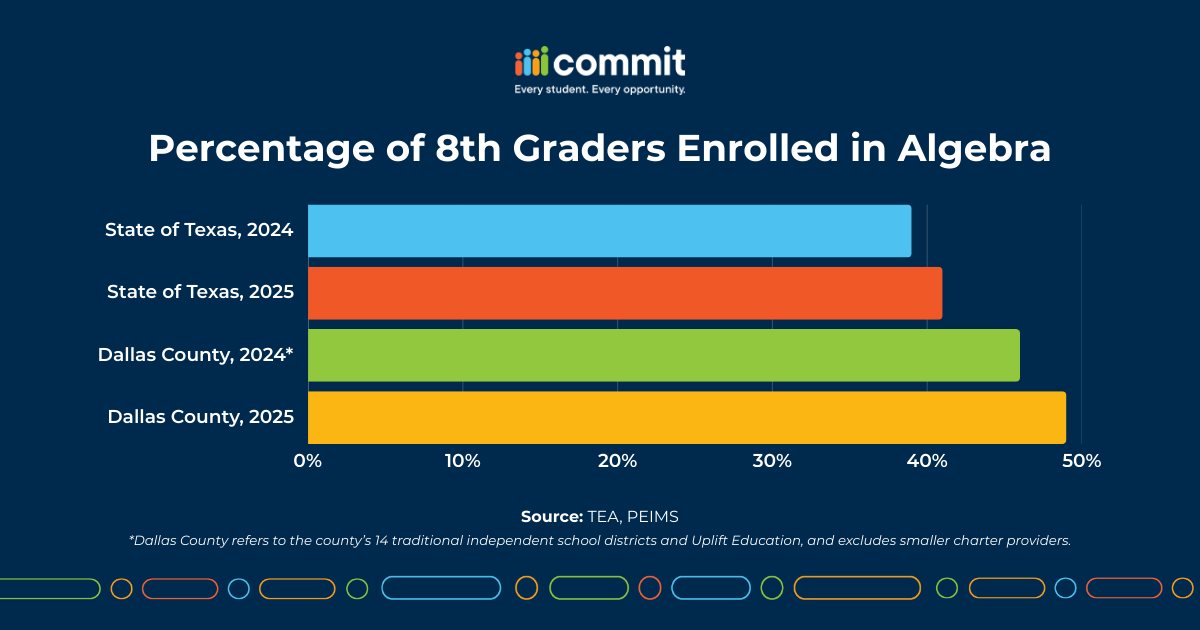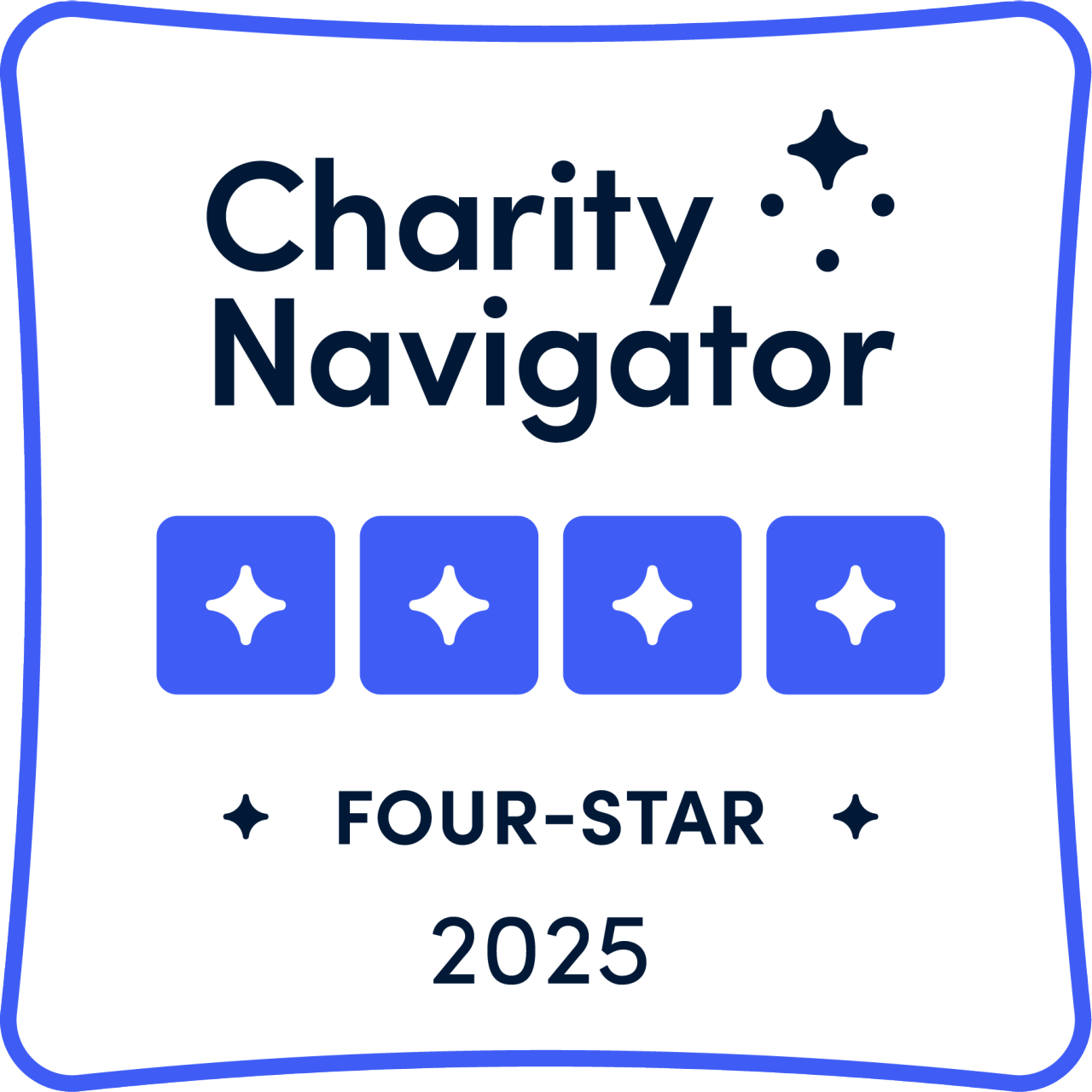How Dallas County School Systems Are Expanding Access to Advanced Math




This blog is spotlighting Uplift Education and Dallas ISD because they have achieved notable gains in mathematics. Both districts have increased 8th grade enrollment in Algebra 1 and grown the number of middle school students meeting grade-level standards in this key subject.
Senate Bill 2124 (88R), authored in 2023 by State Sen. Brandon Creighton and sponsored by State Rep. Donna Howard, increased access to Algebra I, a critical indicator of postsecondary success and, ultimately, a living wage.
This policy automatically enrolls students in an advanced math pathway in sixth grade if they perform in the top 40% of their class in fifth grade math, requiring parents' permission to opt out. Previously, access to these courses depended on school leader approval or a student’s proactive opt-in, both of which contributed to persistent opportunity gaps.
This is important because taking advanced math in sixth grade ensures students are on track to take Algebra I in eighth grade, which in turn allows them to take college-level math coursework in high school. Research from our partners at the E3 Alliance in Austin has demonstrated that taking college-level math in high school makes students more likely to enroll and persist in postsecondary education.
While still early in its statewide implementation, this policy promises to have the greatest positive impact on students experiencing economic disadvantage as well as Black and Hispanic students, who have historically been underrepresented in advanced coursework. Since its implementation, both eighth grade enrollment in Algebra I as well as the total rate of students meeting standards in this critical subject has increased across the state. SB 2124 demonstrates what’s possible when our public education system is designed to expand opportunity for all students, not just a select few.

“Dallas County school districts are making meaningful progress in increasing the number of students entering high school with Algebra I credit and, on a pathway, to graduate with college-level math credit,” says Sile Robinson, Interim Chief Regional Impact Officer for Commit. “We’re encouraged by the early data and look forward to continuing to monitor the impact of SB 2124 as it expands access to advanced coursework and strengthens the pipeline of students prepared for college and career success.”
Students across Dallas County are already seeing the benefits. Dallas ISD was an early adopter, implementing the policy in the 2019–2020 school year. Now, over half of their eighth graders are enrolled in advanced Algebra I, and the district has seen a two-percentage point increase in the share of middle school students meeting or exceeding grade-level standards between 2025-2024. This story underscores that expanding access to rigorous coursework not only supports districtwide progress; but it also opens doors for more students to thrive.
The same momentum is building in Uplift Education, which has set a goal of enrolling all eighth graders in Algebra I. In 2024, 77% of Uplift Education eighth graders were enrolled in Algebra I. One year later, enrollment jumped 18 percentage points, reaching 95%. During that same period, STAAR results showed a three-percentage-point increase in middle school students meeting or exceeding grade-level standards, reinforcing the idea that strategic policies drive sustainable gains.

Fueling this progress are many intentional, data-driven strategies supported by Commit Partnership’s Academic Readiness team. Their work helps translate policy into classroom practice for grades 4-12 in school districts across Dallas County. Specifically, last year’s Policy Workshop supported districts with implementing SB 2124 and increasing access to advanced math while the Math Learning Series aimed to improve achievement through a professional learning community that deepened educator content knowledge and fostered vertical alignment.
The state is also wisely recognizing that districts should be applauded for this important work, specifically in their A-F accountability ratings. The proposed 2028 Accountability Refresh would reward campuses with bonus points when students take end-of-course exams in place of grade-level STAAR tests, reinforcing and encouraging increased enrollment in advanced courses. By aligning accountability with opportunity, the refresh will further motivate school systems to support student access to rigorous, high-impact learning.
SB 2124 helped set the stage for this momentum, and Dallas ISD and Uplift Education are just two examples of what’s possible. With strong data and statewide alignment, school systems across Texas can build on these gains and implement proven strategies with fidelity. As the state updates key levers like the A–F system, we’re seeing real momentum in improving both access and outcomes for our kids.
Interested in learning more about expanding access to advanced coursework or participating in one of our professional learning communities? Reach out to Commit ‘s Interim Chief Regional Impact Officer Sile Robinson at sile.robinson@commitpartnership.org.




.avif)